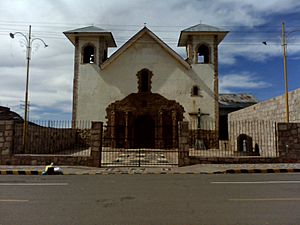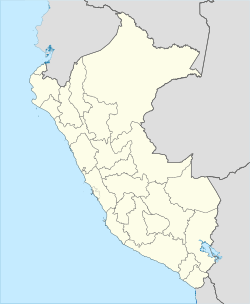Huancané facts for kids
Quick facts for kids
Huancané
Wanqani
|
|
|---|---|
|
Town
|
|

Church of Huancané
|
|
| Country | |
| Region | Puno |
| Province | Huancané |
| District | Huancané |
| Elevation | 3,841 m (12,602 ft) |
Huancané is a town in Peru. It is the main town, or capital, of the Huancané Province. The town's name comes from the Aymara words wanqa (meaning "a big stone") and -ni (a suffix). So, "Wanqani" means "the one with a big stone" or "the place with big stones."
Huancané is located in the Puno Region of Peru. It sits about north of Lake Titicaca, which is a very famous lake. Most of the people living in Huancané, about 7,000 residents, speak the Aymara language.
Geography and Location
Huancané is found in the southeastern part of Peru. It is part of the Andes Mountains region. The town is quite high up, at an elevation of 3,841 meters (about 12,598 feet) above sea level. Being so high means the air is thinner and the climate is cooler.
The town's location near Lake Titicaca is important. Lake Titicaca is the largest lake in South America by water volume. It is also the highest navigable lake in the world. This lake influences the local weather and supports unique plant and animal life.
Climate in Huancané
Huancané has a cool climate because of its high elevation. The weather changes throughout the year, with distinct wet and dry seasons.
The wet season usually runs from December to March. During these months, the town receives the most rainfall. The dry season is from May to August, with very little rain.
Temperatures in Huancané are generally mild during the day. However, nights can be quite cold, especially during the dry season. It can even drop below freezing. The warmest months are typically October and November.
| Climate data for Huancané, elevation 3,842 m (12,605 ft), (1991–2020) | |||||||||||||
|---|---|---|---|---|---|---|---|---|---|---|---|---|---|
| Month | Jan | Feb | Mar | Apr | May | Jun | Jul | Aug | Sep | Oct | Nov | Dec | Year |
| Mean daily maximum °C (°F) | 15.0 (59.0) |
15.0 (59.0) |
15.0 (59.0) |
15.4 (59.7) |
15.3 (59.5) |
14.7 (58.5) |
14.6 (58.3) |
15.2 (59.4) |
16.2 (61.2) |
16.5 (61.7) |
17.0 (62.6) |
16.1 (61.0) |
15.5 (59.9) |
| Mean daily minimum °C (°F) | 4.3 (39.7) |
4.2 (39.6) |
3.4 (38.1) |
1.4 (34.5) |
−2.5 (27.5) |
−4.9 (23.2) |
−5.3 (22.5) |
−3.8 (25.2) |
−0.6 (30.9) |
1.6 (34.9) |
2.6 (36.7) |
3.8 (38.8) |
0.4 (32.6) |
| Average precipitation mm (inches) | 126.4 (4.98) |
117.3 (4.62) |
92.8 (3.65) |
35.1 (1.38) |
10.2 (0.40) |
4.8 (0.19) |
4.4 (0.17) |
8.0 (0.31) |
23.5 (0.93) |
52.8 (2.08) |
51.3 (2.02) |
105.4 (4.15) |
632 (24.88) |
| Source: National Meteorology and Hydrology Service of Peru | |||||||||||||
Culture and Language
The main language spoken in Huancané is Aymara. This is an indigenous language spoken by many people in the Andes region. Spanish is also spoken, especially in schools and for official business.
The culture of Huancané is rich with traditions from the Aymara people. These traditions include music, dances, and festivals. Many of these celebrations are linked to ancient customs and the agricultural calendar.
See also
 In Spanish: Huancané para niños
In Spanish: Huancané para niños
 | Lonnie Johnson |
 | Granville Woods |
 | Lewis Howard Latimer |
 | James West |


